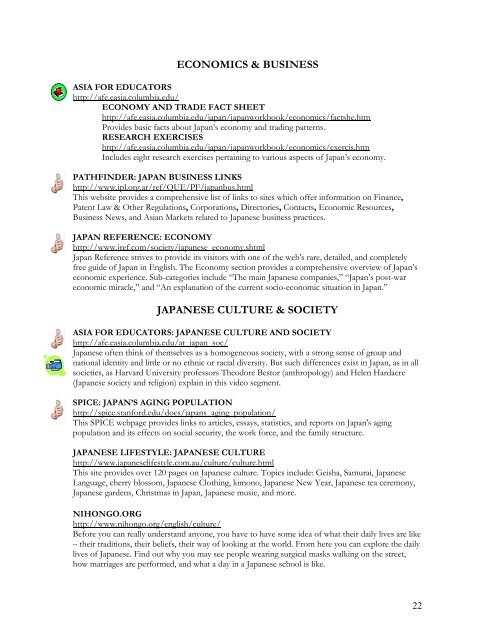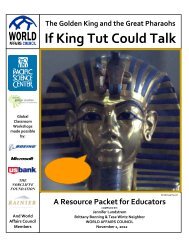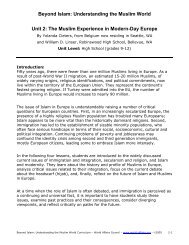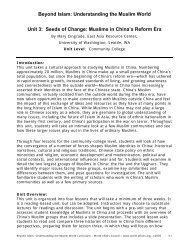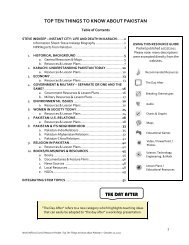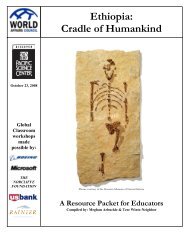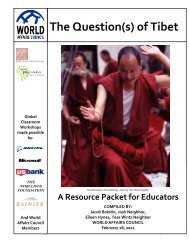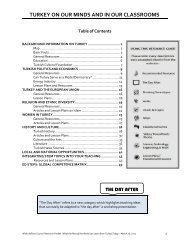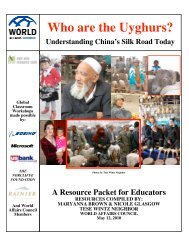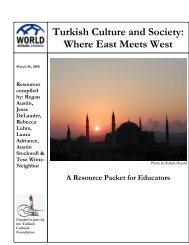The Japanese Approach to Environmental Issues - World Affairs ...
The Japanese Approach to Environmental Issues - World Affairs ...
The Japanese Approach to Environmental Issues - World Affairs ...
You also want an ePaper? Increase the reach of your titles
YUMPU automatically turns print PDFs into web optimized ePapers that Google loves.
ECONOMICS & BUSINESSASIA FOR EDUCATORShttp://afe.easia.columbia.edu/ECONOMY AND TRADE FACT SHEEThttp://afe.easia.columbia.edu/japan/japanworkbook/economics/factshe.htmProvides basic facts about Japan’s economy and trading patterns.RESEARCH EXERCISEShttp://afe.easia.columbia.edu/japan/japanworkbook/economics/exercis.htmIncludes eight research exercises pertaining <strong>to</strong> various aspects of Japan’s economy.PATHFINDER: JAPAN BUSINESS LINKShttp://www.ipl.org.ar/ref/QUE/PF/japanbus.htmlThis website provides a comprehensive list of links <strong>to</strong> sites which offer information on Finance,Patent Law & Other Regulations, Corporations, Direc<strong>to</strong>ries, Contacts, Economic Resources,Business News, and Asian Markets related <strong>to</strong> <strong>Japanese</strong> business practices.JAPAN REFERENCE: ECONOMYhttp://www.jref.com/society/japanese_economy.shtmlJapan Reference strives <strong>to</strong> provide its visi<strong>to</strong>rs with one of the web's rare, detailed, and completelyfree guide of Japan in English. <strong>The</strong> Economy section provides a comprehensive overview of Japan’seconomic experience. Sub-categories include “<strong>The</strong> main <strong>Japanese</strong> companies,” “Japan’s post-wareconomic miracle,” and “An explanation of the current socio-economic situation in Japan.”JAPANESE CULTURE & SOCIETYASIA FOR EDUCATORS: JAPANESE CULTURE AND SOCIETYhttp://afe.easia.columbia.edu/at_japan_soc/<strong>Japanese</strong> often think of themselves as a homogeneous society, with a strong sense of group andnational identity and little or no ethnic or racial diversity. But such differences exist in Japan, as in allsocieties, as Harvard University professors <strong>The</strong>odore Bes<strong>to</strong>r (anthropology) and Helen Hardacre(<strong>Japanese</strong> society and religion) explain in this video segment.SPICE: JAPAN’S AGING POPULATIONhttp://spice.stanford.edu/docs/japans_aging_population/This SPICE webpage provides links <strong>to</strong> articles, essays, statistics, and reports on Japan's agingpopulation and its effects on social security, the work force, and the family structure.JAPANESE LIFESTYLE: JAPANESE CULTUREhttp://www.japaneselifestyle.com.au/culture/culture.htmlThis site provides over 120 pages on <strong>Japanese</strong> culture. Topics include: Geisha, Samurai, <strong>Japanese</strong>Language, cherry blossom, <strong>Japanese</strong> Clothing, kimono, <strong>Japanese</strong> New Year, <strong>Japanese</strong> tea ceremony,<strong>Japanese</strong> gardens, Christmas in Japan, <strong>Japanese</strong> music, and more.NIHONGO.ORGhttp://www.nihongo.org/english/culture/Before you can really understand anyone, you have <strong>to</strong> have some idea of what their daily lives are like– their traditions, their beliefs, their way of looking at the world. From here you can explore the dailylives of <strong>Japanese</strong>. Find out why you may see people wearing surgical masks walking on the street,how marriages are performed, and what a day in a <strong>Japanese</strong> school is like.22


